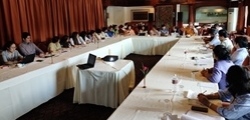
Multi Stakeholder Workshop on Climate Finance in Nepal

National and international experts from government and non-government sectors at a recent programme in Nepal dwelt on from different angles the issues of Nepal’s need and ability to access international climate finance, equitable use of such finance, what the government is doing and what could have been done differently for better results, thereby leading to insightful interaction.
International experts stressed the need for countries like Nepal struggling to access international climate fund to repair their misconception that the more the accredited entities the higher the amount of money they can access. Lesser number of well qualified and efficient entities is what international instruments like Green Climate Fund (GCF) look for and want to see to it that the fund benefits particularly the most vulnerable groups, focusing on women and girls, who are disproportionately affected by climate change, they remarked.
One of the national experts, while questioning government’s efficiency in mobilizing climate funds for the benefit of the most needy, was of the view that compared to the inflow of climate finance the loss being borne by economically and socially backward people mainly indigenous groups and women is very high. Another expert referred to the need for Nepal to reflect towards the end of 2030 on its performance regarding its international commitments such as Sustainable Development Goals and Paris Agreement and pointed out the lack of a mechanism of compiling of all the scattered knowledge, data and information for the country to showcase as its achievements.
As for climate finance management a government representative, while highlighting the salient features of the revised climate change policy of the country, said the policy attempts at identifying national sources of climate finance, enhancing access to international finance and ensuring equitable mobilization of both national and international finance.
A multi-stakeholder dialogue on climate finance organized on 2 August 2019 in Kathmandu by Prakriti Resources Centre (PRC) with the support of Both Ends brought the experts together. They included Dr. Keshav Raj Gautam from the Ministry of Forests and Environment, Prof. Dr. Benito Muller from Ecbi, UK, Ms Anju Sharma from Oxford Climate Policy, UK, Dr. Pasang Dolma Sherpa from Centre for Indigenous Peoples’ Research and Development (CIPRED) and Ms Shanti Karanjit from UNDP. A total of 31 participants representing Climate and Development Dialogue, Direct Access Entities (DAEs), NGOs working in gender and climate change, INGOs, youth and academicians participated in the event. For more details find Report of Workshop
